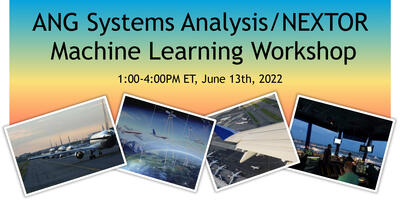On June 13, the Federal Aviation Administration (FAA) and the NEXTOR(link is external) consortium held a Machine Learning Workshop to stimulate thoughts and discussions on how the fast-growing machine learning techniques can be used for problems of interest to the FAA. Berkeley ITS faculty Mark Hansen and recent alumnus Lu Dai (’22) were moderator and panelist, respectively, for the FAA Machine Learning workshop. The workshop brought together more than 100 FAA employees, contractors and researchers to engage in a cross-disciplinary dialogue and discuss current research work, methodological approaches, and challenges to advance the application of machine learning in aviation research.
Dr. Lu Dai drew on her dissertation work – “Data-Driven Real-Time Predictive Risk Intelligence: A Case Study for Go-Arounds” – to share with attendees her research experience and perspectives on applying machine learning techniques for aviation research. The presented work includes anomaly detection algorithm to identify risky flight operations from unlabeled data, statistical models to quantify the factor contributions to the event occurrence, generative adversarial networks to augment the minority class, sequential learners to continuously monitor developing risks, and a data streaming pipeline for real-time deployment. This work has been included in the 2021 NASA Small Business Innovation Research (SBIR) program, and is recently sponsored by Berkeley DeepDrive(link is external) to migrate the efforts for autonomous driving vehicle-to-vehicle conflict identification.

In addition to Dai’s talk, Dr. Alexander Estes from the University of Minnesota, Dr. Lance Sherry from George Mason University, and ITS alumnus Dr. Yu Zhang (’08) from the University of South Florida also offer their expertise and vision in the areas of air traffic management, dispatch operations, and multi-airport systems. After the presentations, Dr. Mark Hansen moderated a panel discussion.
“There was good interaction with the audience and positive discussions,” says Dave Knorr, one of the workshop organizers and the FAA Division Manager, “This workshop helps get folks thinking more about applications.”
——
Dr. Mark Hansen is a Professor of Civil and Environmental Engineering at the UC Berkeley. He graduated from Yale with a Bachelor’s degree in Physics and Philosophy in 1980, and has a PhD in Engineering Science and a Masters in City and Regional Planning from UC Berkeley. Prior to graduate school, Dr. Hansen worked as a physicist at the Environmental Protection Agency. Since joining the Berkeley faculty in 1988, he has led transportation research projects in urban transportation planning, air transport systems modeling, air traffic flow management, aviation systems performance analysis, aviation safety, aviation environmental analysis, and air transport economics. He has taught graduate and undergraduate transportation courses in economics, systems analysis, planning, probability and statistics, and air transportation. Professor Hansen is the Berkeley co-director of the National Center of Excellence in Aviation Operations Research, a multi-university consortium sponsored by the Federal Aviation Administration. He is former Chair of Transportation Research Board Committee AV-060, Airport and Airspace Capacity and Delay. He has served as Associate Editor of Operations Research and Transportation Research E. He is a recipient of the Frances McKelvey award for his research and teaching in aviation, and an Honorary Professor at the National University of Aeronautics and Astronautics in Nanjing, China.
Dr. Lu Dai holds a Ph.D. and M.S. in CEE from UC Berkeley, with minors in Machine Learning and Statistics. She was advised by Prof. Mark Hansen, and was a researcher affiliated with NEXTOR and Lawrence Berkeley National Laboratory. Her research broadly focuses on developing data-driven learning algorithms and statistical models to solve real-world problems. She has collaborated with NASA, FAA, Lawrence National Lab, and ATAC Corporation on multiple research projects covering air traffic management, aviation safety, network modeling, urban transportation planning, system performance and reliability. Her dissertation research on Data-Driven Real-Time Predictive Risk Intelligence for Go-Arounds has been included in the NASA Small Business Innovation Research (SBIR) program in 2021. Dr. Dai was named by MIT as the “Rising Stars in CEE” in 2021, and is the recipient of the FAA Young Scientists Grant (2018), the Robert P. Wadell Fellowship for Civil Engineering Innovation (2019 – 2021), the INFORMS AAS Best Student Presentation first-place winner (2021), as well as several Best Paper Awards from international conferences.

